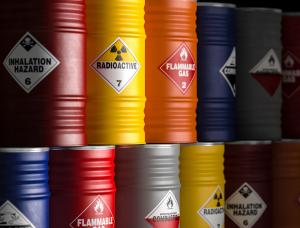
From cleaning products to fuel, aerosols to lithium batteries, dangerous goods are everywhere. These materials, classified under strict regulations, can pose serious risks if mishandled - threatening not only health and safety but also the environment, property, and reputation of the businesses involved.
In the UK, the handling and transport of dangerous goods is tightly regulated. But compliance isn’t just about ticking boxes, it starts with proper training.
What Are Dangerous Goods?
“Dangerous goods” are substances or articles with hazardous properties—flammable, explosive, toxic, corrosive, or environmentally harmful. They’re grouped into nine UN classes and are governed by UK and international rules like ADR (road), IATA (air), and IMDG (sea).
These regulations cover everything from:
- Correct packaging and labelling
- Use of safety data sheets
- Vehicle and driver requirements
- Emergency response procedures
Why Training Is So Important
✅ It’s a Legal Requirement: UK law mandates that all employees involved in the handling, storage, or transport of dangerous goods must receive appropriate training, tailored to their role.
🚧 It Prevents Accidents: Proper training reduces the risk of leaks, fires, injuries, or environmental damage. Staff learn how to safely store, label, transport, and respond to incidents.
💷 It Saves You Money: Avoiding fines, downtime, reputational harm, and insurance claims begins with getting it right the first time through training.
🔍 It Supports Compliance and Audits: Training ensures your teams are confident, your documentation is correct, and your processes stand up to inspections.
Real-World Examples of Penalties (UK, 2024–2025)
Several organisations across the UK have faced major penalties in the last 12 months for failing to properly manage dangerous goods. While we won’t name names, here are examples of what went wrong:
💥 Explosion Incident: A waste facility mishandled hazardous gases during a chemical process, leading to an explosion and life-changing injuries for two workers. The firm was fined over £300,000, plus six-figure court costs.
🔥 Burn Injury from Hot Fluid: Poor risk assessment and inadequate safety procedures led to a worker being severely burned by scalding liquid. The penalty - A £500,000 fine for breaching basic safety protocols.
☣️ Toxic Substance Spill: Failure to train staff on handling corrosive chemicals resulted in a serious workplace incident and environmental contamination. The company paid over £1 million in fines and cleanup costs.
🚚 Vehicle Incident in Warehouse: An untrained staff member was hit by a skip wagon due to a lack of traffic segregation and poor pedestrian safety. The business was fined £1.2 million.
🏭 Repeated Violations: Despite previous enforcement notices, one company failed to fix safety breaches around chemical fume exposure and machine guarding. Fines totalled £80,000, with additional court fees.
Lessons from These Cases
These examples aren’t rare exceptions - they reflect common training gaps:
|
Problem |
|
What Training Could Prevent |
|
Inadequate handling of chemicals |
|
Better hazard communication, PPE use, and storage awareness |
|
Vehicle/pedestrian collisions |
|
Site safety training, segregation plans, and traffic control |
|
Poor emergency response |
|
Spill response and first aid training |
|
Repeated non-compliance |
|
Refresher courses and internal audits |
|
High environmental damage |
|
Awareness of environmental risks and containment measures |
Who Needs Dangerous Goods Training?
You don’t need to be a chemist or HGV driver to need training. It applies to:
- Warehouse operatives
- Delivery drivers
- Freight and logistics teams
- Admin or clerical staff completing documentation
- Managers responsible for storage or movement
- Any staff interacting with chemicals, batteries, or pressurised containers
- Training should be role-specific and updated regularly
Common UK Training Types
- General Awareness Training – For all staff handling or near dangerous goods
- ADR Driver Training – Mandatory for drivers transporting dangerous goods by road
- IATA DGR Training – For shipping goods by air
- IMDG Training – For goods transported by sea
- DGSA Training – For Dangerous Goods Safety Advisers overseeing operations
The UK takes dangerous goods management seriously, and so should you. From financial penalties to reputational damage, the cost of getting it wrong far outweighs the cost of good training.
Whether you're a business owner, a manager, or a frontline worker, investing in proper, ongoing dangerous goods training is one of the best decisions you can make - for compliance, safety, and peace of mind.





